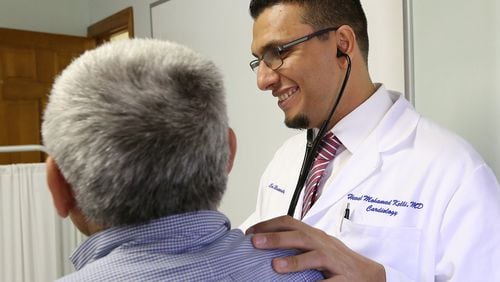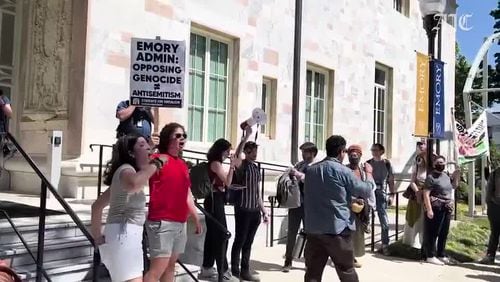Georgia’s growing Syrian-American community expressed deep gratitude Friday for the Trump administration’s surprise U.S. missile strike in their homeland but said much more needs to be done to protect civilians following this week’s deadly chemical weapons attack.
Asad, a naturalized U.S. citizen who asked that his last name not be published to protect relatives still living in his native country, voted for Donald Trump and said Friday he is happy the Republican president took action.
“I felt like Donald Trump really earned my vote,” said Asad, a Newnan man who fled Syria after being tortured. “He acts like a human being. He acts like a responsible president. He has a duty toward the world.”
IN DEPTH: Georgia’s “Ellis Island” braces for Trump travel ban
MORE: Here is every executive order Donald Trump has signed
On Thursday, U.S. ships fired 59 Tomahawk cruise missiles at Al Shayrat airfield. The offensive came after U.S. officials concluded that President Bashar al-Assad’s regime dropped poison bombs in a rebel-held part of northern Syria, killing as many as 80 men, women and children. The U.S. attack targeted the airfield where American officials say Syrian planes launching the chemical attack had taken off. The Syrian government has denied involvement
While Asad praised the military action, he argued the whole Syrian air force should be wiped out. Syria’s president, he said, has been treating his countrymen like “bugs.”
“We are really living in a humanitarian crisis,” said Asad, who owns an underground storage tank inspection company. “Those people in Syria — they are not bugs. The regime there — it is as if (Assad) sprayed them with those chemicals like bugs. And he does not care.”
Dr. Heval Kelli, who came here with his Kurdish family fleeing persecution in Syria in 2001, said the Trump administration should move to protect civilians in the wake of the U.S. strike. Kelli is among an estimated 1,373 Syrian natives living in Georgia, according to a 2015 estimate by the U.S. Census Bureau.
“The Syrian regime is a killer regime, and they will do anything at any cost to stay in power,” said Kelli, a cardiology fellow at Emory University School of Medicine. “I hope we have a plan to protect people from retaliation.”
A naturalized U.S. citizen like Asad, Kelli voted for Democrat Hillary Clinton for president, but he applauded Trump’s decision to strike Syria’s airfield.
“It feels like after six years someone did something… to stand up to Assad and tell him this is not right anymore,” he said. “This is a sign sent to Assad that you can’t do this to your people.”
Taha, a Kurdish refugee from Syria who asked that his last name not be published to shield family members still in his native country, compared Assad to Adolf Hitler. In halting English, he offered a succinct reaction to the U.S. missile attack.
“Thank you, America,” said Taha, who lives in Decatur. And then Taha — who came here with his family in 2015 — spoke in Kurdish with his young daughter translating for him: “I do not want people to die. I want the bad people to stop killing people.”
Taha is among many Syrian refugees Kelli and Asad have been helping resettle in Georgia. With its affordable housing, mass transit and plentiful jobs, the Atlanta region has become a major destination for people fleeing persecution in Syria. Since 2011, when the civil war began, 634 Syrian refugees have resettled in Georgia, federal figures show.
Leading up to Thursday’s missile strike, Trump has been viewed with deep unease in the Syrian-American community. The president has moved aggressively to try to halt the flow of Syrian refugees to the United States.
But the new violence in Syria highlights the urgent need to continue welcoming refugees fleeing that country’s humanitarian crisis, said advocates. The Trump administration is now fighting in several federal courts to save its proposed travel ban, which would temporarily bar visitors from six Muslim-majority countries as well as all refugees from coming to the U.S. Proponents of Trump’s executive order say the pause is needed so the government can tighten its security screening process.
“The horrific chemical weapons attacks on Syrian civilians by their own government exacerbates what is already the greatest humanitarian disaster of this generation,” said J.D. McCrary, executive director of the International Rescue Committee’s Atlanta office, a refugee resettlement agency.
“Now, more than ever, we should be welcoming refugees fleeing persecution at the hands of their own government, yet since January the U.S. has made every attempt to close its doors to the world’s most vulnerable. How many more children need to die before our country extends a safe and welcoming home for Syrian families to restart their lives?”
Joshua Sieweke — the Atlanta office director of World Relief, another refugee resettlement agency — offered a similar view.
“It is incredibly difficult for someone to have to pick up and start over somewhere else,” he said. “But if there is any country that should be willing to engage the complexity of that and if there is any country that can solve those problems, I would like to think it is ours.”
About the Author







